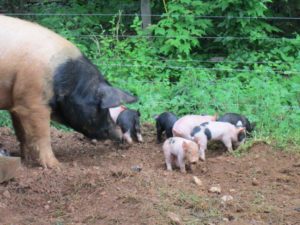Yes, I’m using a big number 1,001 in that title. Can I tell 1,001 stories about rutabaga? Hmm, not sure I could quite get to that number. So “exaggeration for the purpose of emphasis,” as a friend of mine used to say.
But I really want you to remember that there are always lots of ways to tell food stories.
Of course, there’s the food itself. Where does it come from? How is it grown or produced? How do most people prepare it? Can backyard gardeners grow it successfully? If you’re a multi-generational producer, talk about how you learned from your parents or grandparents.
You can also take an “angle” on the food, depending on the interests of your audience. Is it produced in a sustainable manner? Is it more likely grown on family farms or by BigAg? How is the way you grow or produce it “better” than other ways? If you focus on local ingredients, say why – and name some of your purveyors. Their stories are your stories, too!
 If you raise animals that later become food, you can think about how to tell their stories. Pigs and chickens can be pretty photogenic creatures, so show them off! Do your children name the pigs or chickens? What happens when those animals are processed? How do you explain this to children?
If you raise animals that later become food, you can think about how to tell their stories. Pigs and chickens can be pretty photogenic creatures, so show them off! Do your children name the pigs or chickens? What happens when those animals are processed? How do you explain this to children?
Talk about the history of the food or the dish it’s most commonly used in. Is it mostly prepared around a certain holiday or season of the year? What mistake do people sometimes make when fixing this food?
If you’re a chef, you can talk about all the other ingredients that go with your featured dish. How do you decide what to combine with “this” to give it “that” flavor or texture? And it’s okay to use what I call “culinary school” terms. Most people these days have heard most of them through our endless hours of consuming cooking shows!
 If you have tips and tricks on how to use an uncommon ingredient or pitfalls to avoid when cooking with a specific food, tell that story.
If you have tips and tricks on how to use an uncommon ingredient or pitfalls to avoid when cooking with a specific food, tell that story.
There really are a nearly unlimited supply of stories to tell around food. What I hear most often from folks is that they either don’t think a story would be interesting or don’t know how to tell it. So what you have to do is step outside your persona as a farmer, producer, chef, restaurant owner, etc. for just a minute. Look from the outside in – what do you see? What questions might you want to ask an expert? (Hint: You’re the expert!)
This shift in point-of-view is really helpful if you find yourself stuck in the “what do I say” trap.
And listen, when you’ve told your 1,000 stories and are out of ideas, come back and I’ll give you more options!